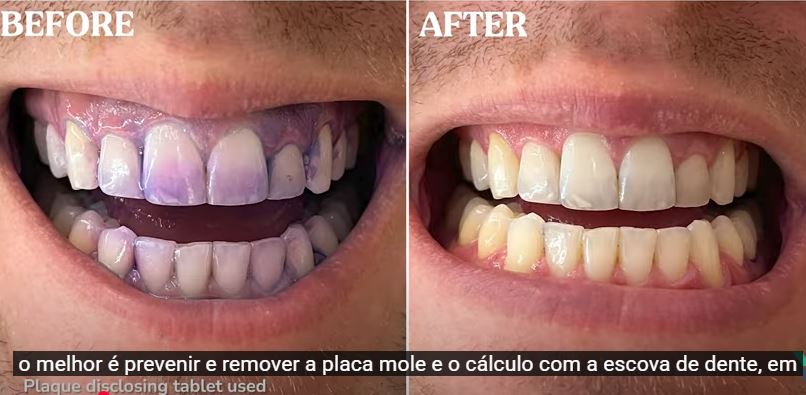Tartar buildup can be bothersome, but the good news is that you can manage it with some at-home practices. While professional dental cleanings are important for maintaining oral health, there are several effective methods you can try to reduce tartar buildup at home and maintain a cleaner, healthier mouth.
What Tartar Is and Why It’s Important to Remove It
Tartar, also known as dental calculus, forms when plaque on your teeth hardens over time. Plaque is a sticky layer of bacteria that naturally forms on your teeth after eating or drinking. If not removed in time, it hardens into tartar. Not only does tartar cause yellow or brown stains on your teeth, but it also holds bacteria that may lead to more serious dental issues, such as gum disease and tooth decay.
Signs of tartar buildup include yellow or brown stains on your teeth and gums, a rough texture, and bad breath. Removing tartar is challenging without professional cleaning tools, but with the right habits, you can reduce its buildup significantly.
Brushing and Flossing: Your First Line of Defense
Brushing and flossing are essential in preventing tartar from accumulating on your teeth. By brushing your teeth with fluoride toothpaste twice a day and flossing daily, you can greatly reduce plaque and prevent it from turning into tartar. The key is to act promptly, as plaque becomes harder to clean the longer it stays on your teeth.
Brushing Tips:
- Use a soft-bristled toothbrush to protect your enamel.
- Brush for at least two minutes, ensuring you cover every surface, especially the gumline.
- Floss daily to clean the spaces between your teeth that your toothbrush can’t reach.
Mouthwash: A Helpful Addition to Your Routine
Mouthwash can complement brushing and flossing but should not replace them. Antiseptic mouthwashes can help reduce plaque buildup by killing bacteria, which can otherwise lead to tartar. Some mouthwashes also contain ingredients that help break down plaque before it turns into tartar.
For a refreshing mouthfeel and to protect your gums, choose a mouthwash that does not contain alcohol to avoid dryness.
Natural Remedies for Tartar Prevention
If you’re looking for a natural way to help manage tartar, there are a few remedies you can try. While these should not replace professional dental care, they can be a helpful addition to your routine.
- Baking Soda: Baking soda is mildly abrasive and can help remove surface stains and prevent plaque buildup. Mix a small amount with water to make a paste, then gently brush your teeth.
- White Vinegar Rinse: White vinegar can help soften tartar. Mix two tablespoons of vinegar with warm water and use it as a mouthwash. Be cautious, as excessive vinegar can erode tooth enamel.
- Coconut Oil Pulling: Coconut oil pulling involves swishing oil in your mouth for 15-20 minutes. This age-old practice helps reduce bacteria and plaque, though it should be used alongside brushing.
Additional Tips for Tartar Prevention

Incorporate the following habits into your routine to further reduce tartar buildup:
- Chew Sugar-Free Gum: Chewing sugar-free gum after meals can help stimulate saliva production, which naturally washes away food particles and bacteria.
- Eat Tartar-Preventing Foods: Crunchy fruits and vegetables like apples, carrots, and celery can help clean your teeth as you eat. Avoid sugary and starchy foods, which promote plaque formation.
Table: Key Tips to Prevent and Remove Tartar
| Method | Description | Cautionary Notes |
|---|---|---|
| Brushing Twice a Day | Use fluoride toothpaste to remove plaque. | Brush gently to avoid damaging enamel. |
| Flossing Daily | Removes plaque and food particles between teeth. | Be gentle to avoid gum injury. |
| Mouthwash | Reduces plaque buildup and kills bacteria. | Use alcohol-free mouthwash to avoid dryness. |
| Baking Soda | Scrubs surface stains and prevents plaque buildup. | Use sparingly to avoid enamel damage. |
| White Vinegar Rinse | Softens tartar for easier removal. | Use in moderation to avoid enamel erosion. |
| Coconut Oil Pulling | Reduces bacteria and plaque. | Follow with brushing to maintain cleanliness. |
What to Avoid: Dangerous Home Remedies
While some home remedies can help, avoid using sharp tools like dental picks to scrape tartar off your teeth. This can damage your gums and enamel. Overusing abrasive substances like baking soda can also wear down your enamel over time. Always prioritize gentle, regular care with brushing, flossing, and occasional natural remedies.
Maintaining Oral Health at Home
While you can help manage tartar buildup at home, it’s crucial to remember that these methods should complement, not replace, professional dental care. Regular dentist visits are essential for removing stubborn tartar and ensuring your teeth remain in top shape.
By adopting healthy habits and combining them with professional cleanings, you can keep your mouth healthy and tartar-free.
For More Information: The American Dental Association offers additional tips and resources to help you maintain good oral health.